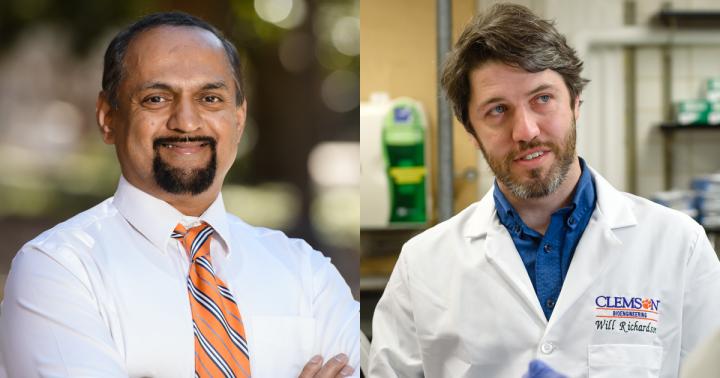Two Clemson University researchers receive R01 grants

Credit: Clemson University
Valentine’s Day is a time to celebrate love and romance, but the holiday has also become an opportunity to promote heart health, a tradition that continues as Clemson University bioengineers announce the launch of two separate research projects.
Will Richardson and Naren Vyavahare said Thursday that they have each received grants from the National Institutes of Health for new research related to the heart. The two grants combined represent $4.1 million in new research funding in Clemson’s Department of Bioengineering.
The research they are conducting has the potential to affect millions of patients who suffer from many forms of cardiovascular disease and related illness, including heart failure, hypertension, chronic kidney disease and type 2 diabetes.
Richardson, an assistant professor of bioengineering, is creating computer models aimed at providing better treatment for cardiac fibrosis, a condition that contributes to heart failure. As many as 60 percent of patients die within five years of developing heart failure, which afflicts 6.5 million Americans, Richardson said.
No drugs have been approved to treat cardiac fibrosis specifically, and doctors are often left with trial-and-error experimentation when treating patients who have it, he said.
Richardson envisions a day when measurements from a patient’s blood or tissue sample would be plugged into mathematical equations based on how molecules interact in the body. Overnight, patients would have personalized risk assessments and treatments plan, he said.
You can read more about Richardson’s work at bit.ly/RichardsonNIH.
Vyavahare, the Hunter Endowed Chair of Bioengineering, is working on what could be the first treatment to reverse vascular calcification, a condition that occurs when mineral deposits build up on blood vessel walls and stiffen them. It is most prevalent in aging patients and those with chronic kidney disease and type 2 diabetes, Vyavahare said.
Complications from vascular calcification can range from hypertension to death.
The nanoparticles that Vyavahare is developing are many times smaller than the width of a human hair and would deliver two medicines to calcified blood vessels. One medicine would remove the mineral deposits that cause blood vessels to become calcified, and another would return elasticity to the blood vessels.
You can read more about Vyavahare’s work at bit.ly/VyavahareNIH.
The Richardson and Vyavahare projects were both funded through the National Institutes of Health’s R01 program. Richardson is receiving $1.9 million, and Vyavahare is receiving $2.2 million.
Martine LaBerge, chair of the Department of Bioengineering, said Richardson and Vyavahare are highly deserving of the grants.
“The R01 program is highly competitive,” she said. “Their awards are further confirmation that Clemson is home to some of the nation’s top bioengineering faculty.”
Anand Gramopadhye, dean of the College of Engineering, Computing and Applied Sciences, congratulated Richardson and Vyvahare on their grants.
“The grants underscore that Drs. Richardson and Vyavahare are conducting research that their peers hold in high esteem,” Gramopadhye said. “They are well positioned to advance health innovation, which is part of the ClemsonForward strategic plan.”
Agneta Simionescu, an assistant professor of bioengineering, has also received $1.38 million through the R01 program. The Simionescu award was announced in November and is aimed at better understanding cardiovascular disease in patients with diabetes.
Richardson and Simionescu were among the faculty members trained as part of SC BioCRAFT, a National Institutes of Health Center of Excellence. The center’s primary goal is to increase the number of South Carolina biomedical researchers who are supported by grants from the National Institutes of Health.
Vyavahare leads SC BioCRAFT, which stands for the South Carolina Bioengineering Center for Regeneration and Formation of Tissues.
###
Media Contact
Paul Alongi
[email protected]
864-350-7908




